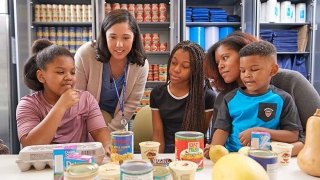Food Pharmacy Is Just What the Doctor Ordered
Published on
Community Impact ReportPublished on
Community Impact ReportIn fall 2018, Children’s Hospital of Philadelphia launched a pediatric, hospital-based food pharmacy to promote healthy nutrition and address food insecurity in the Philadelphia area. Part of CHOP’s Healthy Weight Program — a multidisciplinary, comprehensive initiative that targets pediatric obesity — the Healthy Weight Food Pharmacy is a food bank and education center that aims to reduce hunger and improve health by making nutritious foods readily available to patients and their families.
One in five people in Philadelphia experiences food insecurity, which means they don’t consistently have access to enough nutritious food. A cornerstone of the Healthy Weight Program is teaching families about the relationship between wholesome food and overall health. However, fresh, nutritious food can sometimes be expensive, and if families can’t afford it, they often turn to the least expensive option — processed foods that are high in fat and calories and can put children at risk of obesity, diabetes and hypertension (high blood pressure).
 Food Pharmacy Manager Iliana Garcia, standing, discusses the available foods and preparation options to Dallas, Davionne, Ronald, and their mother, Brooke.
When the Healthy Weight Clinic identifies a family as food-insecure, the family is referred to CHOP’s onsite Food Pharmacy, where manager Iliana Garcia meets with them privately to help determine their needs. The Food Pharmacy provides referred families a three-day supply of nutritious food, including fresh produce, whole grains, dairy and eggs. Families can customize their bags depending on allergies and preferences, but Garcia encourages them to try new foods and recipes that won’t strain their budgets.
Food Pharmacy Manager Iliana Garcia, standing, discusses the available foods and preparation options to Dallas, Davionne, Ronald, and their mother, Brooke.
When the Healthy Weight Clinic identifies a family as food-insecure, the family is referred to CHOP’s onsite Food Pharmacy, where manager Iliana Garcia meets with them privately to help determine their needs. The Food Pharmacy provides referred families a three-day supply of nutritious food, including fresh produce, whole grains, dairy and eggs. Families can customize their bags depending on allergies and preferences, but Garcia encourages them to try new foods and recipes that won’t strain their budgets.
As of June 2019, the Food Pharmacy program has enrolled 219 patients. Each patient is sent home with enough food for their entire family — more than 800 people in all have benefitted from the program.
“So far, we have distributed 5,200 pounds of food,” says Saba Khan, MD, attending physician with CHOP’s Healthy Weight Program and Director of the Food Pharmacy. “That’s the equivalent of over 500 meals.”
The Food Pharmacy was made possible in part by a generous donation from GIANT Food Stores, a longtime CHOP supporter.
In addition to food distribution, Food Pharmacy staff also work with families to address their long-term nutrition needs by connecting them to community resources. Families that aren’t already enrolled in nutrition benefit programs — such as the Supplemental Nutrition Assistance Program (SNAP) or Women, Infants and Children (WIC) — are given information about eligibility and helped to enroll. Families that are enrolled learn how to maximize their benefits and participate in incentive programs that provide access to things like affordable produce.
In May 2019, the Food Pharmacy began to screen families for additional needs, including those related to housing, transportation, utilities and behavioral health. Some enrolled families report concerns about unstable housing, and many struggle to pay utility bills. Others have cancelled medical appointments due to a lack of transportation. Still more families are affected by behavioral health needs, such as depression. The Food Pharmacy offers onsite social workers to address these needs by connecting families to appropriate resources.
“We hope to continue learning from the program we have,” says Khan. “We want to make sure we’re offering a program that’s serving families effectively.”
Ultimately, program leaders hope to expand the Food Pharmacy, making these vital resources available to even more patients and families.